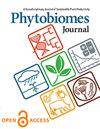Plant–Microbe Interactions: From Genes to Ecosystems Using Populus as a Model System
IF 2.6
3区 生物学
Q2 MICROBIOLOGY
M. Cregger, Dana L. Carper, Stephan Christel, M. Doktycz, J. Labbé, Joshua K. Michener, Nicholas C. Dove, E. Johnston, Jessica A. M. Moore, Jessica M. Vélez, J. Morrell-Falvey, W. Muchero, D. Pelletier, S. Retterer, T. Tschaplinski, G. Tuskan, D. Weston, C. Schadt
求助PDF
{"title":"Plant–Microbe Interactions: From Genes to Ecosystems Using Populus as a Model System","authors":"M. Cregger, Dana L. Carper, Stephan Christel, M. Doktycz, J. Labbé, Joshua K. Michener, Nicholas C. Dove, E. Johnston, Jessica A. M. Moore, Jessica M. Vélez, J. Morrell-Falvey, W. Muchero, D. Pelletier, S. Retterer, T. Tschaplinski, G. Tuskan, D. Weston, C. Schadt","doi":"10.1094/PBIOMES-01-20-0009-FI","DOIUrl":null,"url":null,"abstract":"Plant–microbe symbioses span a continuum from pathogenic to mutualistic, with functional consequences for both organisms in the symbiosis. In order to increase sustainable food and fuel production in the future, it is imperative that we harness these symbioses. The tree genus Populus is an excellent model system for studies examining plant–microbe interactions due to the wealth of genomic information available and the molecular tools that have been developed to manipulate Populus–microbe symbioses. In this review, we highlight how Populus can serve as a model system to explore plant–microbe interactions. Specifically, we highlight research linking Populus–microbe interactions from the gene to the ecosystem level. We explore why Populus is an excellent model for perennial plant systems, the molecular underpinnings of Populus–microbe interactions, how host genetics influence microbial community composition, and how microbial communities vary at fine spatial scales and between Populus spp. Furthermore, we explore how changes in the microbiome may affect ecosystem-level functions in managed and natural ecosystems. Understanding and manipulating these interactions in Populus has the potential to improve plant health and affect ecosystem sustainability and processes because Populus trees function as foundational species in many natural ecosystems and are also deployed in managed ecosystems for various agroforestry applications. [Formula: see text] Copyright © 2021 The Author(s). This is an open access article distributed under the CC BY-NC-ND 4.0 International license .","PeriodicalId":48504,"journal":{"name":"Phytobiomes Journal","volume":" ","pages":""},"PeriodicalIF":2.6000,"publicationDate":"2021-01-01","publicationTypes":"Journal Article","fieldsOfStudy":null,"isOpenAccess":false,"openAccessPdf":"","citationCount":"18","resultStr":null,"platform":"Semanticscholar","paperid":null,"PeriodicalName":"Phytobiomes Journal","FirstCategoryId":"99","ListUrlMain":"https://doi.org/10.1094/PBIOMES-01-20-0009-FI","RegionNum":3,"RegionCategory":"生物学","ArticlePicture":[],"TitleCN":null,"AbstractTextCN":null,"PMCID":null,"EPubDate":"","PubModel":"","JCR":"Q2","JCRName":"MICROBIOLOGY","Score":null,"Total":0}
引用次数: 18
引用
批量引用
Abstract
Plant–microbe symbioses span a continuum from pathogenic to mutualistic, with functional consequences for both organisms in the symbiosis. In order to increase sustainable food and fuel production in the future, it is imperative that we harness these symbioses. The tree genus Populus is an excellent model system for studies examining plant–microbe interactions due to the wealth of genomic information available and the molecular tools that have been developed to manipulate Populus–microbe symbioses. In this review, we highlight how Populus can serve as a model system to explore plant–microbe interactions. Specifically, we highlight research linking Populus–microbe interactions from the gene to the ecosystem level. We explore why Populus is an excellent model for perennial plant systems, the molecular underpinnings of Populus–microbe interactions, how host genetics influence microbial community composition, and how microbial communities vary at fine spatial scales and between Populus spp. Furthermore, we explore how changes in the microbiome may affect ecosystem-level functions in managed and natural ecosystems. Understanding and manipulating these interactions in Populus has the potential to improve plant health and affect ecosystem sustainability and processes because Populus trees function as foundational species in many natural ecosystems and are also deployed in managed ecosystems for various agroforestry applications. [Formula: see text] Copyright © 2021 The Author(s). This is an open access article distributed under the CC BY-NC-ND 4.0 International license .
植物与微生物的相互作用:从基因到生态系统——以杨树为模型系统
植物与微生物的共生关系跨越了从致病到互惠的连续体,对共生关系中的两种生物都有功能影响。为了在未来增加可持续的粮食和燃料生产,我们必须利用这些共生关系。杨树属是研究植物与微生物相互作用的一个很好的模型系统,这是由于丰富的基因组信息和已经开发的分子工具来操纵杨树与微生物的共生关系。在这篇综述中,我们重点介绍了如何将杨树作为研究植物与微生物相互作用的模型系统。具体来说,我们强调了从基因到生态系统水平将杨树与微生物相互作用联系起来的研究。我们探讨了为什么杨树是多年生植物系统的优秀模型,杨树与微生物相互作用的分子基础,寄主遗传如何影响微生物群落组成,以及微生物群落如何在精细空间尺度和杨树之间变化,此外,我们还探讨了微生物组的变化如何影响管理和自然生态系统的生态系统水平功能。由于杨树在许多自然生态系统中是基础物种,并且在各种农林业应用中也被部署在管理生态系统中,因此了解和操纵杨树中的这些相互作用有可能改善植物健康并影响生态系统的可持续性和过程。[公式:见正文]版权所有©2021作者。这是一篇在CC BY-NC-ND 4.0国际许可下发布的开放获取文章。
本文章由计算机程序翻译,如有差异,请以英文原文为准。

 求助内容:
求助内容: 应助结果提醒方式:
应助结果提醒方式:


